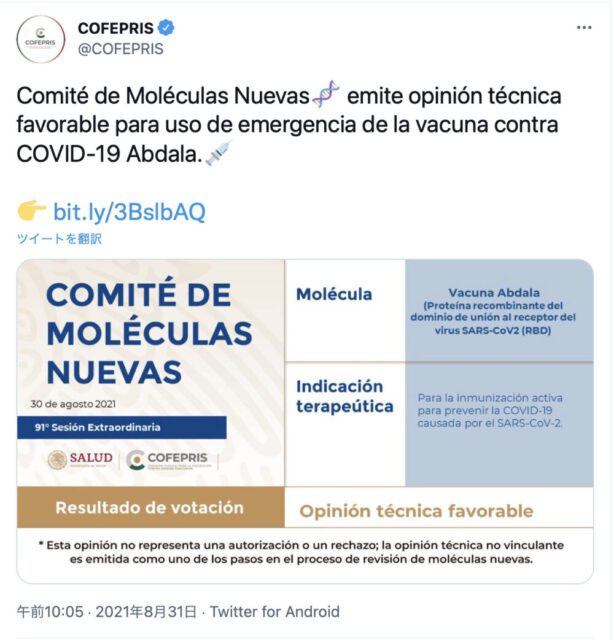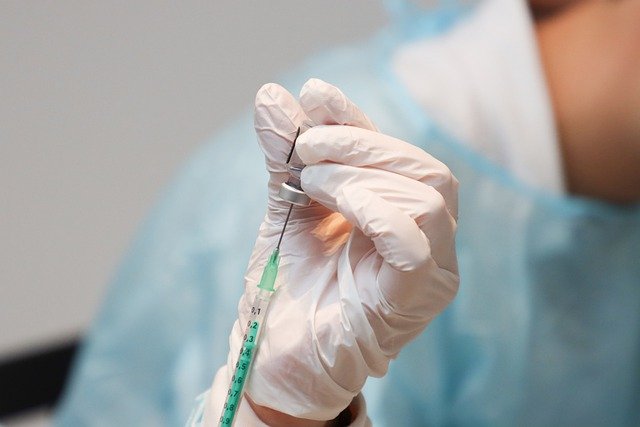キューバでは米国からの経済・社会的封鎖もありワクチン、医療機器が手に入らない。だから、COVID-19のパンデミックと戦うためにはワクチンも自分たちで開発する必要があった。キューバには高い医療技術、豊富なワクチン開発の経験、30年以上にわたる予防接種の実績がある。そして今回もまた世界保健機関(WHO)がワクチンとして認める最低50%の有効性基準を大幅に上回るそれを作り上げた。一つがキューバの作家で国民的英雄であるホセ・マルティの詩から名をとったAbdala、もう一つがSoberanaだ。(Abdala、Soberanaの記事は各々リンクから。)
Abdalaワクチンは組換えタンパク質ワクチンで、その作用はコロナウイルスの「表面のトゲトゲ」を再現、体内に導入することで、免疫が侵入者を認識し、実際に感染した場合にそのウイルスを攻撃できるよう訓練するものだ。組換えワクチンの特徴としては極端な冷蔵保存を必要としないことにある。また、Abdala摂取者は、ベータ、アルファ、イプシロン、デルタの各株に対する防御力を身につけていると言う。
新型ウイルスに対してキューバの医薬品・機器・医療機器管理センター(Centro para el Control Estatal de Medicamentos, Equipos y Dispositivos Médicos:CECMED)は、7月9日、臨床試験で92.28%の有効性を示すということを発表している。それは国内での利用はもとよりベネズエラにもすでに輸送されている。そしてラテンアメリカの国のみならず世界のいくつかの国からもそれへの期待が寄せられている。
メキシコもその国の一つだ。連邦健康リスク保護委員会(Comisión Federal para la Protección contra Riesgos Sanitarios :COFEPRIS)の補助機関「新分子委員会(Comité de Moléculas Nuevas:CMN)」はこの度キューバの遺伝子工学・バイオテクノロジーセンター(Centro de Ingeniería Genética y Biotecnología de Cuba:CIGB)の作ったAbdalaに対して好意的な見解を発表した。

CMNは補助的な諮問機関で、国内マーケットに存在しない健康食品や医薬品である新分子の衛生登録申請や、ヒトへの使用に関する研究申請について、予備的な意見を述べる立場にある。新しい分子とは医薬品の活性物質である天然または合成由来の物質で、国内では以前に使用されたことがなく、その有効性、安全性および治療目的が科学的文献に十分に記載されていないもののことを言い、
1) 世界的に登録されておらず、メキシコでの登録を目的とした医薬品または薬剤(新規分子化合物)。
2) 他の国では存在していても、臨床経験が少ない、または議論の余地がある情報で、メキシコでは登録されておらず、わが国での登録を意図している医薬品または薬。
3) 国内市場に存在しない2種類以上の医薬品の組み合わせを構成することを意図した医薬品、または
4) 他の治療適応症での販売を意図した医薬品または既に販売されている医薬品。
を指す。
CMNの勧告はCOFEPRISの承認を約束するものではないものの、審査プロセスにおける意思決定を強化するための貴重な情報を提供する。具体的には製品の品質、安全性、有効性を裏付けるために研究所が提示した証拠に基づき、テクニカルオピニオンを述べる。
ちなみに新分子委員会は、直近でもわずか4ヶ月の間に50種類の分子を分析し、科学的な勧告を発表している。その中には、3種類のワクチン、COVID-19対策の7種類の治療薬、9種類の腫瘍治療薬、8種類の重度の慢性および急性の痛みに対する治療薬が含まれていた(※)。
CNMがAbdalaの緊急利用に対してポジティブな意見を出したことは、メキシコにおける新たな予防薬の導入に一歩近づいた形となる。マルセロ・エブラルド(Marcelo Ebrard)外務大臣もCOFREPISの決定を歓迎し、この地域におけるコロナウイルスワクチンの開発・製造を支援する意思を示している。
メキシコ国内で本ワクチンが緊急使用の認可を得るための次のステップは、衛生認可委員会(Comisión de Autorización Sanitaria :CAS)による審査がある。製薬会社のメキシコ・ニューロニック社とキューバ遺伝子工学・バイオテクノロジーセンター(Centro de Ingeniería Genética y Biotecnología:CIGB)が提出したアブダラの書類を分析するのだ。
メキシコにおけるAbdala導入検討が進む中、同ワクチンの製造元であるCIGBを監督する国営バイオ製薬会社BioCubaFarmaが米国のジョー・バイデン向けの公開書簡を発表した。
それは米国の大統領がパンデミックの起きているキューバに対して、そこでの処置は悲惨で「破綻国家」でしかないと述べたことに端を発する。彼の言葉はキューバの医療システムに直接触れたことのある米国人を含む多くの人々を驚かせ、キューバでCOVID-19と命懸けになって戦っているキューバ人医療従事者をも憤慨させたと書いてある。
文書の中に書いてあることをよく読み考えてほしい。もちろん考え方はそれぞれだろう。でもそこで述べられている「困っている人がいたら手を差し伸べる」などと言った概念は根本的であり、それでいてとても重要なことだと私は考える。もちろん毎年国連総会で「キューバへの封鎖解除」へほぼ全ての国が賛成票を投じているにもかかわらず、未だその対応が変わることがないことについても疑問を呈す。そしてキューバー米国間のみならず、考えが根本的に違う人々とも社会課題の解決に向けた協力体制、互いを尊重しあえる社会を皆で作って行けたらた、そう思うのである。書簡全文は以下の通り。
President Biden:
You recently referred to Cuba at a White House saying: “I would be prepared to give significant amounts of vaccines if… an international organization would administer those vaccines and do it in a way that average citizens would have access to those vaccines.” You also called Cuba a “failed state”.
These statements surprised many, including those in the U.S. who have first-hand exposure to Cuba’s health system. It also rankled frontline Cuban health workers risking their lives to contain the COVID epidemic in our country. They do not reflect Cuban reality, and we deplore that disinformation by malicious actors is influencing your policy decisions. As scientists, doctors, and concerned citizens, we believe it’s worth fact-checking three assumptions implicit in what you said.
Assumption one: International intervention is needed to ensure all Cubans receive vaccines.
Assumption two: Cuba’s response to the pandemic has been dismal, symptomatic of a “failed state”.
Assumption three: U.S.-supplied vaccines are the only route to guarantee COVID-19 immunization for Cuba’s 11 million people.
Let’s take these one by one: the first assumption – that intervention is needed to guarantee vaccine access for all Cubans – suggests that vaccine rollout in Cuba is inefficient and discriminatory. But the data does not support this. In fact, as both UNICEF and the World Health Organization have confirmed, childhood vaccination rates are over 99%. Immunization is part of our country’s universal public health system, free to all Cubans regardless of socioeconomic status, politics, religion, sex, or race.
The national immunization program, created in 1962, covers the whole country. Since 1999, all Cubans have been protected against 13 potentially fatal diseases, including diphtheria, tetanus, and pertussis. Eight of these vaccines are manufactured in Cuba.
As a result of high vaccination rates, we have not had a single case of measles. In contrast, the CDC confirmed 1282 measles cases in the United States in 2019, with only 74% of children receiving all CDC-recommended vaccines.
The Finlay Vaccine Institute in Havana developed the world’s first effective vaccine against/for meningitis B (meningococcal disease) in 1989. The annual incidence of meningococcal disease in Cuba dropped from 14.4/100,000 population before vaccination to less than 0.1/100,000 since 2008— eliminating the illness as a public health problem in the country.
Several factors explain the success of Cuba’s national vaccination program: people trust the easily accessible neighborhood family doctors and nurses, and the health professionals at their community polyclinics—making vaccine hesitancy very rare. In turn, the health system’s organizational capacities make vaccine rollout fast and dependable. Finally, Cuban biotechnological research and production centers are well integrated with the needs of the public health system.
Working partnerships on vaccination have developed with the World Health Organization and UNICEF. But none of these has ever suggested the need to step in to administer vaccines in Cuba. Rather, Cuban vaccine experts have been called upon to assist in global efforts to eliminate polio, and our production facilities have been tapped by WHO to export urgently needed vaccines to the “meningitis belt” in sub-Saharan Africa.
Assumption two: Cuba’s “failed” pandemic response. It is puzzling why, with so many real COVID catastrophes in the Western Hemisphere, only Cuba is labelled a “failed state”. Cuba has indeed seen a recent spike in cases that threatens to overwhelm the health system in parts of the country. However, it’s response has been more effective than many other nations that have not received this harsh criticism from the U.S.
All countries are now challenged with new COVID variants, such as Delta, often driving sharp increases in cases. Cuba is no exception. What makes Cuba unique is the need to manage the epidemic under a crippling financial, trade and economic embargo enforced by the U.S. government for the last six decades. The 243 additional restrictions slapped on by the Trump administration—everyone still in place under your presidency—were intended to close the blockade’s few remaining loopholes, and thus choke off revenues to Cuba. This reduces the cash available to buy medical supplies and food, and delays in the arrival of materials to the country.
Assumption three: the only route to COVID immunity in Cuba is through U.S.-supplied vaccines. This ignores the fact that more than two million Cubans, or nearly 30,2 % of the population, have already been fully vaccinated with Cuban developed vaccines.
The Abdala vaccine received emergency use authorization from the Cuban regulatory authority on July 9, making it the first vaccine to achieve this status in Latin America. Abdala achieved 92% efficacy in Phase III clinical trials, while the Soberana Vaccine achieved 91% and is also close to emergency use authorization. At the current rate of vaccinated, the entire population could be reached by October or November. Difficulties in rollout, including imports of vital vaccine ingredients, are due primarily to the financial squeeze of U.S. sanctions.
If the U.S. government really wanted to help Cubans, it could roll back the 243 Trump-era measures—possible with the stroke of the president’s pen. Congress could also lift sanctions altogether, as demanded each year by overwhelming votes at the UN General Assembly by the nations of the world.
During the pandemic, science reiterates that (politics aside) we are all in this together. All of us are threatened not only by disease but also by the unprecedented challenge of climate change. In this context, health systems of all countries should be supported, not undermined; and collaboration should be the order of the day. More so, taking into consideration the alarming dearth of vaccines worldwide, especially dangerous for middle- and low-income countries. A number of them have already shown an interest in acquiring the Cuban vaccines, and we would argue that such a Cuban contribution to vaccine equity should be applauded by the Biden administration, not stifled. The Cuban Democracy Act of 1992 (Part II.6) explicitly bans exports to Cuba from the U.S. in cases where: “the item to be exported could be used in the production of any biotechnological product”, which includes vaccines.
We had a glimpse of both countries could have done together during the Western African Ebola virus epidemic (2013–2016), when both countries strove to contain disease and save lives. Obviously, the U.S. and Cuban governments differ on fundamental issues. Yet the world is full of such discrepancies. The essential question, not only for Cuba and the U.S., but also for human civilization, is whether nations can respect each other enough to exist side-by-side and cooperate.
President Biden, you can do much good if you move in the right direction and take into consideration what most Cubans living in Cuba desire. This does not include bypassing and weaking its public health system but does include respect for the nation’s achievements. Let us hope that the shared threats posed by the Covid pandemic will lead to more collaboration, not more confrontation. History will be the judge.
キューバおよび世界中の8,000人以上の科学者、医師、関係者が書簡に署名している。彼らとともにサインをしたいという方はこちらから。
※CNMの分析結果はhttps://bit.ly/3eZcVQ7で参照することができる。
参考資料:
1. Cofepris emite opinión favorable de vacuna cubana Abdala contra el covid-19
2. En solo 4 meses el Comité de Moléculas Nuevas emite opinión para 50 principios activos.
3. Cuba’s Abdala Vaccine To Be Used for Emergencies in Mexico
4. Avanza aval para aprobar vacuna cubana Abdala contra Covid-19 en México
5. An open letter to President Biden on COVID-19 vaccines for Cuba
6. Cuba’s COVID-19 Vaccine is 92% Effective, Late-Stage Trials Show


No Comments